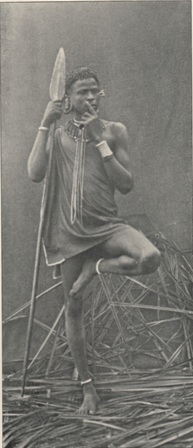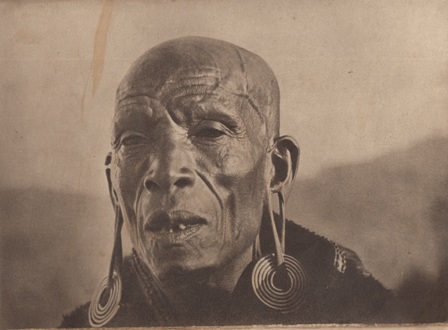- Gakenge – A new born baby for the first few months or so. After that he is referred to as Kaana, baby. Major ceremony – Being born, gūciarwo kwa mwana.
- Kahīī – A young boy floricking about like a young kid goat. major ceremony – The second Birth, gūcokia mwana ihu-iinī
- Kīhīī – A big boy nearing circumcision which would be anything from 12 to 18 years. To be called a Kīhīī (Kīhīī gīkī), is an insult as it is a reference to the fact that one is due or overdue for “straightening” – nī ūtigītie handū.
- Mumo – Kiumīri (sing), Literally means “coming out”, “emerging” like a butterfly from a cocoon into the full broom of God’s creation. Circumcision ceremonies – These were the most important of the Gikūyū ceremonies of becoming. Mambura ma irua.
- Mwanake – A young man until marriage. God’s material creation in its full glory. God, Ngai, did not create a child but a fully grown man. A young man is literally God’s fragment that was fashioned into a man by the creator, Mūmbi. Mwanake nī kīenyū kīa Ngai. Mwanake wa Njaama ya ita is a member of the warrior coupes, military. Mwanake wa Njaama ya kamatimū is a member of the policing and guard coupes, Police.
- Mūthuuri – Karabai. Married man who can still be called upon to serve military duty in a major war.
- Mūthuri wa Kīama – An elder who serves in one or more of the many Councils. Because the Gikuyu system of government had no chiefs or kings, all government was through consensus in the various tribal Councils. Some were standing Councils with a membership representing the various clans. Other Councils were constituted on demand. To be a member of a Council was through the payment of a goat to the Council and there were three levels just as there are three levels in academia today, the Bachelors Degree, The Master’s Degree and the Doctor of Philosophy, PhD. Elders do not serve in the military or police coupes.
Nota bene: There were no serious ceremonies to do with death in Gīkūyū tradition as the Gīkūyū were highly biophilic and all major ceremonies had to do with life or its propagation. Necrophilic societies have death as their major ceremonies.
In The Republic, Plato explains that there are three classes of men – Lovers of wisdom, lovers of honor and lovers of gain. The lovers of wisdom are those individuals in which the Soul of reason has taken control. The lovers of honor are dominated by by the Soul of will, and the lovers of gain by the Soul of appetite. It was reckoned that the Soul of appetite was located in the belly, the Soul of will in the heart and the Soul of reason in the head. Spiritual development or becoming entailed the mastery of the negative impact of these Soul aspects on one’s personality and nurturing the positive aspects. The positive aspects of Soul, solidified in the character of a man into the three virtues namely Temperance, Strength and Prudence.
The negative aspects or lack of the first virtue,Temperance in a man are gluttony, lust, greed and a failure to control the sensuous side in him. Drunkenness and legal or illegal drug abuse are characteristic of such a man and examples of such men are legion especially in all classes of Gīkūyū society. The positive aspects or Temperance solidify in a character that has, harmonious relationships, health and beauty. The negative consequences of having a false sense of the second virtue, Strength are a love of prestige, power, excessive control, cruelty and anger. True Strength or Fortitude solidifies into self mastery, discipline, courage and compassion. The positive aspects of the third virtue, Prudence are wisdom, good judgement, sagacity and the use of reason. Failure to master Prudence obviously leads to poor judgement.
Like every biophilic society, traditional Gīkūyū society was organised to nurture physical as well as spiritual becoming and we may see that the entire emanation from child to elder corresponds with the three parts of Platonic emanation. In the child/boy stage up to circumcision, the Soul of appetite can be said to be supreme. In the warrior stage up to the position of Elder, the Soul of will is in ascendancy and in the elder stage the Soul of reason is meant to be supreme. The word Mūthuurifor a Gīkūyū elder comes from the verb gūthuura, to choose, to be judicious, ie. the capacity to discriminate or make wise decisions
In the final development of the Gīkūyū man, the effect of all three Soul aspects will have solidified into a personality fit to be inducted into the Council, Kīama. If the Soul of appetite is unchecked the man will exhibit all the excesses of rust, gluttony, sensuousness and greed. He will be what they call a gīthagathago, a good for nothing unfit to give the first goat, Temperance, Ūiganīrīru, to the Kīama. The temperate man is a man of moderation in all things, a man with self-control – a man of discipline.
If the Soul of will is given free reign it develops in a man the desire for power, prestige anger, cruelty and excessive control but once conquered, the Soul of will develops a true warrior Spirit – a Samurai. Men like Wan’gombe wa Ihūra, Waiyaki wa Hinga, Kīmathi wa Wachiūri, Che’ Guevara developed this Spirit to a very high degree perhaps to the detriment of the other two virtues. For – lest we forget, they must all three be raised to the level of virtues. The second goat, Strength, Ūcamba, given to the Council, Kīama, signifies that the man has developed this warrior Spirit sufficiently but of course with Temperance. (Ti ūrūme – Ūcamba)
The mastery of the Soul of reason qualifies a man to sit in the inner circle of the Council, Kīama. This is a man who appreciates the abstract ideas that underlie reality – that is, he is not superficial or fooled by surface appearances but contemplates philosophical and metaphysical phenomena. He is a man who has sacrificed at the altar of Self the third goat, Prudence, Ūthurania, and is thus Mūthuuri wa Mbūri ithatū, An Elder of three goats. He is alert, cautious and guarded. He is shrewd and skilled in good judgement. When he stands to speak in the Council he is not frivolous, careless or petty. He chooses his words carefully and with deliberation. He is insightful and with discernment is able to read the intents and contents of the heart, They say, athomaga marī mbahaca, or he reads the letters while they are still sealed in the envelop. He remains calm when face to face with death and is not flustered or made to lose his calm in front of the most sensuous or material suggestion. Such men are rare and the one that comes to mind instantly is The Reverend Doctor, Martin Luther King, Junior. In his famous address, “I Have Been to the Mountaintop”, the day before he was brutally murdered, he closed the speech thus,
Well, I don’t know what will happen now. We’ve got some difficult days ahead. But it doesn’t matter with me now. Because I’ve been to the mountaintop. And I don’t mind. Like anybody, I would like to live a long life. Longevity has its place. But I’m not concerned about that now. I just want to do God’s will. And He’s allowed me to go up to the mountain. And I’ve looked over. And I’ve seen the promised land. I may not get there with you. But I want you to know tonight, that we, as a people, will get to the promised land. And I’m happy, tonight. I’m not worried about anything. I’m not fearing any man. Mine eyes have seen the glory of the coming of the Lord.
Plato does go further to say that a fourth virtue, Justice, Ūiguithania, in which all three virtues of Temperance, Strength and Prudence merge into a World Soul is possible to an individual who becomes a Philosopher King. This could be equated to the highest possible rank in the ladder of Gīkūyū emanation, the Muthamaki. When this happens the individual is said according to Plato, to be “ruled by the divine wisdom dwelling within him.” A Muthamaki, or Philosopher King emerges not from the will of man neither by his own will but by divine authority, through the Grace of the most high God, Mwene Nyaga. He usually emerges during a critical stage in a society and guides the people through the appointed task and then vanishes. He is not an object of adoration by the popular mind and is not necessarily popular or of a great age. Boy kings like Tutenchamun, Solomon, David come to mind. The first Gīkūyū man, who according to Gīkūyū lore is the image of the perfect man was made from a fragment of God, Mwene Nyaga and is the image every Gīkūyū man and woman looks up to, prays and works to become. This generic man, who includes all genders, male and female is a happy balance of all four virtues and is what is depicted in the Gikuyu cross, Nyumba.

The Library surrounded by eager students. The old man’s task is to tell stories. Stories and more stories.
See: Stages of a Gikuyu Woman’s Life








No comments:
Post a Comment